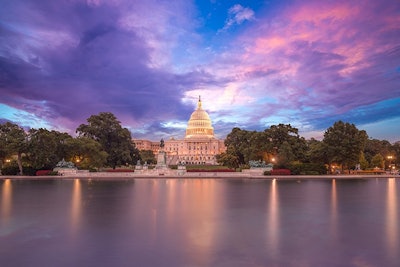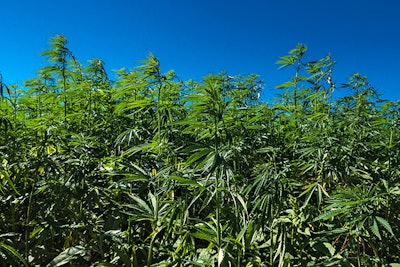
U.S. hemp farmers eager to get to work in 2019 will have to wait: The federal government is currently shut down.
While the passage of 2018 Farm Bill and its hemp legalization provision was met with excitement, a now-routine political snafu has halted federal government operations and effectively blockaded the gateway to legal hemp cultivation.
Until the federal government reopens for business—until the U.S. Congress approves an appropriations bill—the U.S. Department of Agriculture (USDA) is unable to approve state hemp program regulations and the FBI is unable to conduct required background checks. This presents a problem for prospective hemp farmers.
“It could keep someone from getting their business underway,” Jack Wilbur, spokesman for the Utah Dept. of Agriculture and Food, told KUTV on Dec. 31.
Under provisions enacted by the 2014 Farm Bill, 40 states now regulate hemp cultivation. Moving forward now, the USDA reserves the authority to approve or reject those states’ (or commonwealths’) programs under the auspices of the 2018 Farm Bill. Kentucky Agriculture Commissioner Ryan Quarles submitted his commonwealth’s application to the USDA on Dec. 20, the day President Trump signed the agricultural legislation into law.
On Dec. 22, Congressional leaders reached an impasse, and the government shut down.
At issue, on a political level, is whether Trump will sign a spending bill that excludes funding for a U.S.-Mexico border wall, something that he’s been going on about for years now. Democrats have opposed the very idea. Republicans are more of a mixed bag, but one major undercurrent of Washington sentiment is summed up by what U.S. Sen. Mitch McConnell’s spokesperson told the Washington Post this week: “It’s simple: The Senate is not going to send something to the president that he won’t sign.”
All of which is to say that it might be a while before this current shutdown is resolved. In characteristic verbiage, Trump told reporters on Jan. 2 that he’s intent on stalling government operations until he secures funding for the wall. When asked how long he’s willing to go: “As long as it takes,” he said. “I mean, look, I’m prepared. I think the people of this country think I am right. Again, I could have had a lot easier presidency by doing nothing, but I’m here. I want to do it right.”

Quarles and his regulatory counterparts in other states doubtlessly want to see some movement, for the sake of this nascent industry. “Kentucky’s regulatory framework perfectly aligns with the requirements spelled out in the farm bill,” Quarles said when he submitted Kentucky’s paperwork. “Hemp growers, processors, and manufacturers deserve swift action so they can proceed with confidence.”
Stuart Titus, CEO of Medical Marijuana Inc., which manufactures hemp-derived CBD products, has been sourcing most of his company’s product from European farms and processors. Like many other medical cannabis executives (and like many agricultural commissioners, for that matter), Titus sees the potential in legal hemp market in the U.S. as quite promising.
“At this time, obviously, now we’re looking to add on some U.S.-based production, and this is quite exciting for us,” he told Cannabis Business Times. “We see as much as 60 million acres of U.S. farmland [that] could be grown with hemp. For many farmers, it’s a great rotational crop. … Hemp is very robust, very hearty.”
But before the industry really takes off, there’s governmental oversight to contend with—and it’s not just the USDA that hemp farmers will confront in this newly legal regime.
As many states already insist in their hemp pilot programs, all hemp farmers—in fact, all “personnel involved in the cultivation of the crop,” according to Pennsylvania’s Department of Agriculture, for instance—must submit to an FBI background check.
This new provision was included in the federal legalization of hemp to accommodate broader congressional debate over criminal justice elements of the legislation. The argument over whether convicted felons would be allowed to participate in the hemp industry at all dissolved into last-minute compromises in December, which will now permit convicted felons to enter the hemp industry 10 years after their conviction (as opposed to never).
The FBI background check is where that will be settled.
For now, though, nobody is participating in the country’s newest legal industry. In the early days of January, industry stakeholders are hoping that this shutdown is but a congressional blip on the history of U.S. hemp.
“I don’t think too many farmers are going to be planting much before the April-May time period, so it’s not catastrophic,” Titus said, “but certainly we’d like to get this year’s crop under way, and a very good, robust reception for the farmers who do choose to plant hemp.”
Elsewhere, in the broader medical marijuana industry, these periodic federal government shutdowns keep businesses worried for other reasons.
Medical marijuana businesses have been protected through amendments to short-term spending bills since 2014, including the most recent Joyce Amendment (which carried over earlier iterations of the Rohrabacher-Blumenauer amendment) last summer.
While the federal government remains without an appropriations bill on Trump’s desk, it also remains without the Joyce Amendment language. The legislative rider has prohibited the U.S. Department of Justice from spending money on medical cannabis prosecutions. At the moment, and anytime the federal government passes into shut-down mode, those protections for medical cannabis businesses and patients are gone.
Fears of a crackdown are misplaced, however.
"Almost everything dealing with regulations and management of the medical cannabis and adult use industries is really in the hands of the states, so a federal shutdown would be an inconvenience for many, but I don’t expect it would impact operations or access," Chris Lindsey, Senior Legislative Counsel for the Marijuana Policy Project, told Civilized late last year. "If anything, it might result in less federal interest in those that are participating. Because, if anything, a government shutdown would lead to less resources to go after individuals or businesses."
























